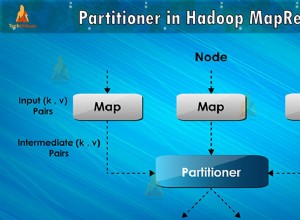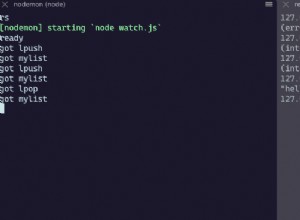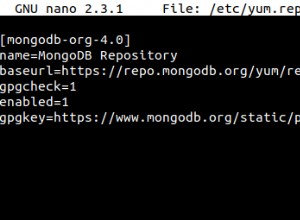Per raggiungere questo obiettivo è necessario creare una permutazione di tutti i percorsi consentiti. Ad esempio:
type Structure = {
user: {
name: string,
surname: string
}
}
type BlackMagic<T>= T
// user.name | user.surname
type Result=BlackMagic<Structure>
Il problema diventa più interessante con gli array e le tuple vuote.
Tuple, l'array con lunghezza esplicita, dovrebbe essere gestita in questo modo:
type Structure = {
user: {
arr: [1, 2],
}
}
type BlackMagic<T> = T
// "user.arr" | "user.arr.0" | "user.arr.1"
type Result = BlackMagic<Structure>
La logica è semplice. Ma come possiamo gestire number[] ? Non vi è alcuna garanzia che indicizzi 1 esiste.
Ho deciso di utilizzare user.arr.${number} .
type Structure = {
user: {
arr: number[],
}
}
type BlackMagic<T> = T
// "user.arr" | `user.arr.${number}`
type Result = BlackMagic<Structure>
Abbiamo ancora 1 problema. Tupla vuota. Matrice con zero elementi - [] . È necessario consentire l'indicizzazione? Non lo so. Ho deciso di utilizzare -1 .
type Structure = {
user: {
arr: [],
}
}
type BlackMagic<T> = T
// "user.arr" | "user.arr.-1"
type Result = BlackMagic<Structure>
Penso che la cosa più importante qui sia qualche convenzione. Possiamo anche usare la stringa `"mai". Penso che spetti a OP come gestirlo.
Poiché sappiamo come dobbiamo gestire diversi casi, possiamo iniziare la nostra implementazione. Prima di continuare, dobbiamo definire diversi helper.
type Values<T> = T[keyof T]
{
// 1 | "John"
type _ = Values<{ age: 1, name: 'John' }>
}
type IsNever<T> = [T] extends [never] ? true : false;
{
type _ = IsNever<never> // true
type __ = IsNever<true> // false
}
type IsTuple<T> =
(T extends Array<any> ?
(T['length'] extends number
? (number extends T['length']
? false
: true)
: true)
: false)
{
type _ = IsTuple<[1, 2]> // true
type __ = IsTuple<number[]> // false
type ___ = IsTuple<{ length: 2 }> // false
}
type IsEmptyTuple<T extends Array<any>> = T['length'] extends 0 ? true : false
{
type _ = IsEmptyTuple<[]> // true
type __ = IsEmptyTuple<[1]> // false
type ___ = IsEmptyTuple<number[]> // false
}
Penso che la denominazione e i test siano autoesplicativi. Almeno ci voglio credere :D
Ora, quando abbiamo impostato tutte le nostre utilità, possiamo definire la nostra utilità principale:
/**
* If Cache is empty return Prop without dot,
* to avoid ".user"
*/
type HandleDot<
Cache extends string,
Prop extends string | number
> =
Cache extends ''
? `${Prop}`
: `${Cache}.${Prop}`
/**
* Simple iteration through object properties
*/
type HandleObject<Obj, Cache extends string> = {
[Prop in keyof Obj]:
// concat previous Cacha and Prop
| HandleDot<Cache, Prop & string>
// with next Cache and Prop
| Path<Obj[Prop], HandleDot<Cache, Prop & string>>
}[keyof Obj]
type Path<Obj, Cache extends string = ''> =
// if Obj is primitive
(Obj extends PropertyKey
// return Cache
? Cache
// if Obj is Array (can be array, tuple, empty tuple)
: (Obj extends Array<unknown>
// and is tuple
? (IsTuple<Obj> extends true
// and tuple is empty
? (IsEmptyTuple<Obj> extends true
// call recursively Path with `-1` as an allowed index
? Path<PropertyKey, HandleDot<Cache, -1>>
// if tuple is not empty we can handle it as regular object
: HandleObject<Obj, Cache>)
// if Obj is regular array call Path with union of all elements
: Path<Obj[number], HandleDot<Cache, number>>)
// if Obj is neither Array nor Tuple nor Primitive - treat is as object
: HandleObject<Obj, Cache>)
)
// "user" | "user.arr" | `user.arr.${number}`
type Test = Extract<Path<Structure>, string>
C'è un piccolo problema. Non dovremmo restituire oggetti di scena di livello più alto, come user . Abbiamo bisogno di percorsi con almeno un punto.
Ci sono due modi:
- estrai tutti gli oggetti di scena senza punti
- fornire un parametro generico aggiuntivo per l'indicizzazione del livello.
Due opzioni sono facili da implementare.
Ottieni tutti gli oggetti di scena con dot (.) :
type WithDot<T extends string> = T extends `${string}.${string}` ? T : never
Mentre sopra util è leggibile e manutenibile, il secondo è un po' più difficile. È necessario fornire un parametro generico aggiuntivo in entrambi i Path e HandleObject .Guarda questo esempio tratto da altri domanda
/ articolo
:
type KeysUnion<T, Cache extends string = '', Level extends any[] = []> =
T extends PropertyKey ? Cache : {
[P in keyof T]:
P extends string
? Cache extends ''
? KeysUnion<T[P], `${P}`, [...Level, 1]>
: Level['length'] extends 1 // if it is a higher level - proceed
? KeysUnion<T[P], `${Cache}.${P}`, [...Level, 1]>
: Level['length'] extends 2 // stop on second level
? Cache | KeysUnion<T[P], `${Cache}`, [...Level, 1]>
: never
: never
}[keyof T]
Onestamente, non credo che sarà facile per nessuno leggerlo.
Dobbiamo implementare un'altra cosa. Dobbiamo ottenere un valore per percorso calcolato.
type Acc = Record<string, any>
type ReducerCallback<Accumulator extends Acc, El extends string> =
El extends keyof Accumulator ? Accumulator[El] : Accumulator
type Reducer<
Keys extends string,
Accumulator extends Acc = {}
> =
// Key destructure
Keys extends `${infer Prop}.${infer Rest}`
// call Reducer with callback, just like in JS
? Reducer<Rest, ReducerCallback<Accumulator, Prop>>
// this is the last part of path because no dot
: Keys extends `${infer Last}`
// call reducer with last part
? ReducerCallback<Accumulator, Last>
: never
{
type _ = Reducer<'user.arr', Structure> // []
type __ = Reducer<'user', Structure> // { arr: [] }
}
Puoi trovare maggiori informazioni sull'utilizzo di Reduce nel mio blog
.
Codice intero:
type Structure = {
user: {
tuple: [42],
emptyTuple: [],
array: { age: number }[]
}
}
type Values<T> = T[keyof T]
{
// 1 | "John"
type _ = Values<{ age: 1, name: 'John' }>
}
type IsNever<T> = [T] extends [never] ? true : false;
{
type _ = IsNever<never> // true
type __ = IsNever<true> // false
}
type IsTuple<T> =
(T extends Array<any> ?
(T['length'] extends number
? (number extends T['length']
? false
: true)
: true)
: false)
{
type _ = IsTuple<[1, 2]> // true
type __ = IsTuple<number[]> // false
type ___ = IsTuple<{ length: 2 }> // false
}
type IsEmptyTuple<T extends Array<any>> = T['length'] extends 0 ? true : false
{
type _ = IsEmptyTuple<[]> // true
type __ = IsEmptyTuple<[1]> // false
type ___ = IsEmptyTuple<number[]> // false
}
/**
* If Cache is empty return Prop without dot,
* to avoid ".user"
*/
type HandleDot<
Cache extends string,
Prop extends string | number
> =
Cache extends ''
? `${Prop}`
: `${Cache}.${Prop}`
/**
* Simple iteration through object properties
*/
type HandleObject<Obj, Cache extends string> = {
[Prop in keyof Obj]:
// concat previous Cacha and Prop
| HandleDot<Cache, Prop & string>
// with next Cache and Prop
| Path<Obj[Prop], HandleDot<Cache, Prop & string>>
}[keyof Obj]
type Path<Obj, Cache extends string = ''> =
(Obj extends PropertyKey
// return Cache
? Cache
// if Obj is Array (can be array, tuple, empty tuple)
: (Obj extends Array<unknown>
// and is tuple
? (IsTuple<Obj> extends true
// and tuple is empty
? (IsEmptyTuple<Obj> extends true
// call recursively Path with `-1` as an allowed index
? Path<PropertyKey, HandleDot<Cache, -1>>
// if tuple is not empty we can handle it as regular object
: HandleObject<Obj, Cache>)
// if Obj is regular array call Path with union of all elements
: Path<Obj[number], HandleDot<Cache, number>>)
// if Obj is neither Array nor Tuple nor Primitive - treat is as object
: HandleObject<Obj, Cache>)
)
type WithDot<T extends string> = T extends `${string}.${string}` ? T : never
// "user" | "user.arr" | `user.arr.${number}`
type Test = WithDot<Extract<Path<Structure>, string>>
type Acc = Record<string, any>
type ReducerCallback<Accumulator extends Acc, El extends string> =
El extends keyof Accumulator ? Accumulator[El] : El extends '-1' ? never : Accumulator
type Reducer<
Keys extends string,
Accumulator extends Acc = {}
> =
// Key destructure
Keys extends `${infer Prop}.${infer Rest}`
// call Reducer with callback, just like in JS
? Reducer<Rest, ReducerCallback<Accumulator, Prop>>
// this is the last part of path because no dot
: Keys extends `${infer Last}`
// call reducer with last part
? ReducerCallback<Accumulator, Last>
: never
{
type _ = Reducer<'user.arr', Structure> // []
type __ = Reducer<'user', Structure> // { arr: [] }
}
type BlackMagic<T> = T & {
[Prop in WithDot<Extract<Path<T>, string>>]: Reducer<Prop, T>
}
type Result = BlackMagic<Structure>
Questo vale la pena considerare l'implementazione




